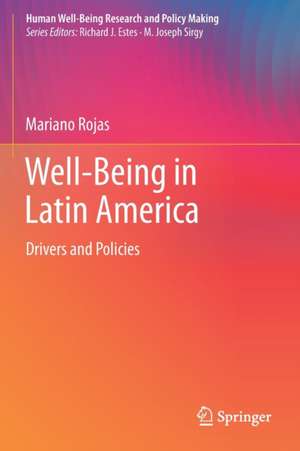Well-Being in Latin America: Drivers and Policies: Human Well-Being Research and Policy Making
Autor Mariano Rojasen Limba Engleză Paperback – 23 oct 2020
The book provides a framework to fully understand the drivers behind high well-being, including the challenges and opportunities that public policy faces in the procurement of people’s well-being. The book provides relevant material for policymakers and social scientist interested in the procurement of well-being.
| Toate formatele și edițiile | Preț | Express |
|---|---|---|
| Paperback (1) | 363.97 lei 6-8 săpt. | |
| Springer International Publishing – 23 oct 2020 | 363.97 lei 6-8 săpt. | |
| Hardback (1) | 370.94 lei 6-8 săpt. | |
| Springer International Publishing – 23 oct 2019 | 370.94 lei 6-8 săpt. |
Preț: 363.97 lei
Preț vechi: 383.12 lei
-5% Nou
Puncte Express: 546
Preț estimativ în valută:
69.64€ • 72.91$ • 57.63£
69.64€ • 72.91$ • 57.63£
Carte tipărită la comandă
Livrare economică 05-19 aprilie
Preluare comenzi: 021 569.72.76
Specificații
ISBN-13: 9783030335007
ISBN-10: 3030335003
Pagini: 184
Ilustrații: XXIV, 184 p. 64 illus., 62 illus. in color.
Dimensiuni: 155 x 235 mm
Greutate: 0.3 kg
Ediția:1st ed. 2020
Editura: Springer International Publishing
Colecția Springer
Seria Human Well-Being Research and Policy Making
Locul publicării:Cham, Switzerland
ISBN-10: 3030335003
Pagini: 184
Ilustrații: XXIV, 184 p. 64 illus., 62 illus. in color.
Dimensiuni: 155 x 235 mm
Greutate: 0.3 kg
Ediția:1st ed. 2020
Editura: Springer International Publishing
Colecția Springer
Seria Human Well-Being Research and Policy Making
Locul publicării:Cham, Switzerland
Cuprins
Chapter 1. Introduction.- Chapter 2. Historical Background of Latin America.- Chapter 3. Well-Being: Conceptualization, Measurement and Research.- Chapter 4. Well-Being in Latin America.- Chapter 5. Drivers: The Current Situation in Latin America.- Chapter 6. Policies for Well-Being.
Notă biografică
Mariano Rojas is Professor of Economics at Universidad UPAEP in Mexico and at Universidad Internacional de La Rioja, Spain. He holds a Ph.D. in Economics from The Ohio State University (United States). He was President of the International Society for Quality of Life Studies (ISQOLS) and is member of Mexico’s National Research System. He coordinated the initiative Measuring the Progress of Societies: A Mexican Perspective. He is the author of ‘The Scientific Study of Happiness’ (FCE) and ‘Can the Economy Provide Happiness?’ (RBA), editor of the ‘Handbook of Happiness Research in Latin America’ (Springer) and ‘The Economics of Happiness: How the Easterlin Paradox Transformed Our Understanding of Well-Being and Progress’ (Springer), and co-editor of the ‘Global Handbook of Well-Being and Quality of Life’ (Springer). His areas of research are Happiness, Quality of Life, Well-Being, Progress, Economic Development, and Poverty, and his regional area ofspecialization is Latin America.
Textul de pe ultima copertă
This book provides an overview of factors fostering well-being in Latin America and discusses many threats to well-being in the region. The book assesses the current well-being situation in Latin American countries and offers an explanation based on its many drivers, such as family arrangements, kindness and affection of interpersonal relations, economic situation, education regimes, political institutions, poverty, income inequality, crime and violence, and the weakness of political institutions.
The book provides a framework to fully understand the drivers behind high well-being, including the challenges and opportunities that public policy faces in the procurement of people’s well-being. The book provides relevant material for policymakers and social scientist interested in the procurement of well-being.
The book provides a framework to fully understand the drivers behind high well-being, including the challenges and opportunities that public policy faces in the procurement of people’s well-being. The book provides relevant material for policymakers and social scientist interested in the procurement of well-being.
Caracteristici
Provides an overview of well-being drivers based on the Latin American experience Moves beyond the dominant paradigm that associates social progress to economic growth Incorporates cultural and historical considerations in the understanding of drivers of well-being Proposes a new framework for the designing of policies for well-being













